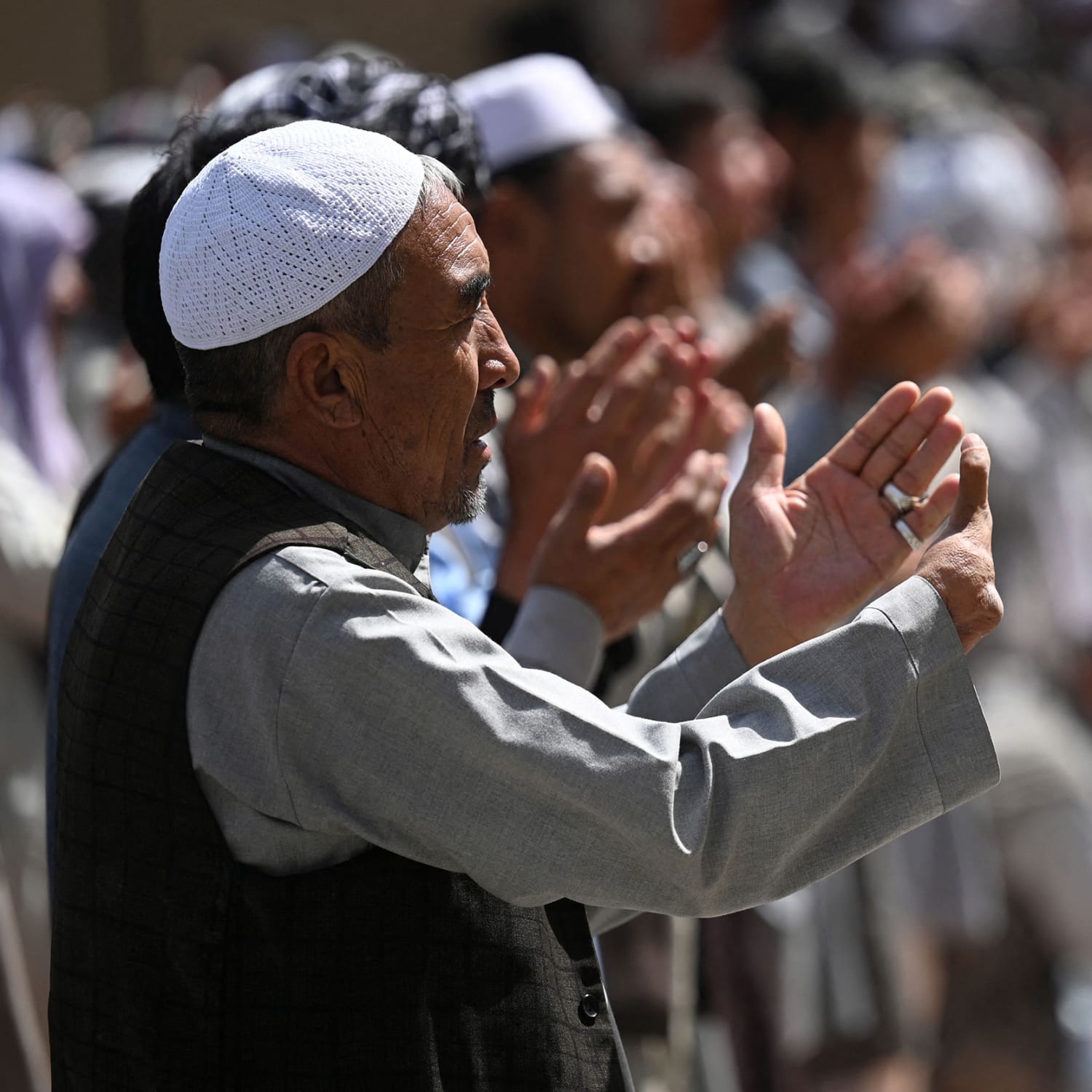
The Taliban gave Gulsom two days to leave her home with her husband and their three young daughters.
The 25-year-old and her family were one of hundreds of Hazara families forcibly evicted from their homes late last month, sparking fears that an ethnic minority that was targeted by Afghanistan’s previous Taliban regime is being persecuted again.
“It was very difficult,” Gulsom said in a WhatsApp voice message Thursday, adding that the Taliban had taken everything from them.
Both Gulsom and her husband, Mohammad, 35, were born and raised in a small village in the Daykundi province, where they grew up as neighbors before they got married and started their family.
The couple, who did not wish to give their last names or the name of their village because they feared persecution, said they had previously relied on subsistence farming to feed themselves. Without access to their crops, they said they did not know how they would survive.
“I’m so confused. I can’t sleep,” Mohammad said. “My wife says that every night she has nightmares.”
For now, the family has found short-term shelter in an empty home owned by a relative in the country’s capital, Kabul. They have also borrowed a small amount of money from a friend to pay for food.
But their relative is planning to sell the property and after that, Mohammad said, he could not “predict the future.”
Taliban spokesman Bilal Karimi told NBC News that there had been a dispute over the land on which Golsum, Mohammad and other Hazara families had been living, and a Shariah court, or a court of Islamic law, had ruled in favor of the claimants. As a result, they left, he said.
But human rights activist Dr. Saleem Javed said the Taliban were using the Shariah to justify the takeover of long-held Hazara land.
“These people have been living on their ancestral lands,” Javed, a Hazara who lives in Sweden, said. “Everybody knows that those areas belong to the Hazaras,” he added.
Javed, who along with other activists has been tracking Taliban actions in Hazara villages, estimated that at least 1,500 families had been forced out of their homes in Afghanistan’s Daykundi and Urugzan provinces, although he said the number could be double that.
With many of them relying on subsistence farming, he said, the situation could be “catastrophic.”
“These people are simple farmers, villagers. They do not have a way of (making) income,” he said. “These lands and villages, they belong to them … But the Taliban do not give heed to this.”
Daniel Balson of Amnesty International said he was also aware of hundreds of Hazara families being forced out of their homes, but he could not verify how many people have been displaced.
Download the NBC News app for breaking news and politics
He also warned that in addition to Hazara families losing their only means of subsistence, they would also have to contend with falling temperatures as winter approaches.
“It’s going to get very cold soon,” he said. “Many of these people who are evicted from their homes, from their lands, from their villages, are going to be cut off from their one means of sustenance, and they’re going to be at risk to the elements in a very real life-or-death way.”
The displacements come after weeks of warnings from the United Nations and rights groups that Hazaras and other minority groups could be persecuted by the Taliban.
A mostly Shiite Muslim ethnic minority, Hazaras make up about 9 percent of the country’s total population of 40 million people, according to the nongovernmental organization Minority Rights Group International.
The majority of Afghans are ethnic Pashtuns and Sunni Muslims, who do not view Shiites as true members of the Islamic faith.
As a result, the Hazara community was brutally oppressed by the Taliban before the hard-line regime was toppled by the U.S.-led invasion in 2001. Hazaras are also frequently targeted by the Islamic State terrorist group, which views them as heretics, and other Sunni Muslim militant groups in both Afghanistan and Pakistan.
“In the 1990s, the Taliban massacred thousands of Hazaras,” said Azra Jafari, a Hazara activist and politician who made history in 2008 after becoming Afghanistan’s first female mayor. She added that Hazaras had remained “the main target for the Taliban” over the past 20 years.
After the Taliban takeover of Afghanistan in August, Amnesty International said in a report that 13 members of the Hazara community, including a teenage girl, were killed by the group. Nine were believed to be government soldiers who had surrendered, the report said.
Karimi denied the Taliban were behind the killings, but said they would investigate the claims. Other Taliban members had been “punished for violating the general amnesty,” offered by the group’s leadership when it took power, he said.
However, Javed said he feared that the forced evictions are part of the Taliban’s way of “testing” how much they can get away with before the international community intervenes.
If the group was not sanctioned, he said, it would return to its old ways.
Gulsom and Mohammad also said they were disappointed by the international community’s silence in the midst of their suffering.
“I am stunned that big nations, big media companies, even our neighboring countries have been silent,” Mohammad said. “No country has even taken a position or put any pressure on the Taliban.”
“Why should we be oppressed like this?” he said. “Aren’t we the people of Afghanistan?”
Source: | This article originally belongs to Nbcnews.com










